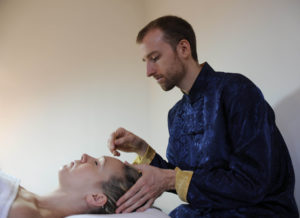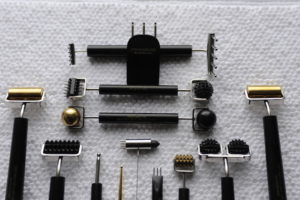more than a facial, dien chen heals the body, mind and emotions too
 A ‘facial’ without skincare products? Sounds strange, but Dien Chen Reflexology treats far more than simply the skin.
A ‘facial’ without skincare products? Sounds strange, but Dien Chen Reflexology treats far more than simply the skin.
I have a love-hate relationship with foot reflexology. No doubt because of various issues with my inner organs, I usually find it pretty painful. So I was intrigued to hear about Dien Chen Reflexology, which uses points on the face instead to encourage a similar kind of self-healing. And following a treatment at the Mandarin Oriental’s Mandarin Spa, I can happily say it is a beautifully mesmerising and relaxing facial treat of a therapy.
Dien Chen Reflexology was created by Vietnamese professor Bui Quoc Chau in 1980. Extrapolating the idea that you can detect a person’s overriding emotions by the lines and shape of their face, Dien Chen applies pressure on the face according to complex multi-reflexology maps, which indicate around 250 healing points in total and stimulate healing throughout the body.
Alex Scrimgeour, the visiting Dien Chen practitioner at the Mandarin Oriental Hong Kong for the next week (scroll down for information on the treatment here), is one of the few Dien Chen Reflexology practitioners outside Vietnam.
“I originally trained in acupuncture and did an internship in Ho Chi Minh City where I heard about Dien Chen,” he says in his calming, soft voice. “I was intrigued because it treats all sorts of conditions like breathing difficulties, ear aches and hearing issues, even cancers and much more.”
I was hoping to hear what he could tell about me from my face just by looking, but he said that while he can infer certain things, face reading isn’t very different from the messages we all take from someone’s appearance. Dimples suggest you are fun loving, for example. A wrinkle between the eyebrows can indicate worry or anger. A diagonal line leading from the outside of the eyes towards the nose can suggest sadness, grief or a broken heart, while lines rising up and out from the same spot are joy lines.
First there’s a consultation, where I share I don’t feel I have much physically wrong with me, but I have just gone through an intense emotional trauma. He comfortingly says he can tailor-make our session to help balance my emotions.
I lie down fully clothed on the massage bed and he starts with a shoulder and neck massage. A practitioner of acupuncture, Shiatsu, Thai massage and Traditional Chinese Medicine, his hands search for areas of stress rather than following a fixed choreography, and his expertise puts me immediately at ease.
Naturally this relaxing start works beautifully for guests at the Mandarin Spa, and also sets it apart from the common or garden variety of Dien Chen found in Vietnam, which usually has clients sitting rather than lying, and receiving just 15 minutes of very specific healing, no luxurious massage.
Once I’m extremely relaxed, he moves on to my head and face, using the tips of his fingers to press into certain points.
“One of the most interesting areas is below and around the ears, and Vietnamese doctors often start there as it is one of the few points where the vagus nerve is accessible,” he explains. “The vagus nerve sets off the body’s parasympathetic rest, digest and healing mode and connects with the function of the heart and lungs. The heart and lungs are the emperors and kings of Chinese medicine – it is believed if they are in good health they bring a knock-on effect to the rest of the body.”
 About half way through the treatment he brings in some of his tools to more precisely stimulate various points around my eyes and eyebrows, sinuses, jaw line, hairline and head. They look rather medieval and intimidating at first with their pointed, combed and prickly looking points. But far from being painful, some felt simply like pressure on the skin, while others brought interesting sensations from release to a fizzy buzzy feeling.
About half way through the treatment he brings in some of his tools to more precisely stimulate various points around my eyes and eyebrows, sinuses, jaw line, hairline and head. They look rather medieval and intimidating at first with their pointed, combed and prickly looking points. But far from being painful, some felt simply like pressure on the skin, while others brought interesting sensations from release to a fizzy buzzy feeling.
Overall it was mesmerising, thanks to the comfortable pressure and the rhythm of the treatment, and I nearly fell asleep.
Once it was over – too soon! – he said the area under my cheek had some congestion, which is the main liver area, which could mean anger. And he suggested I self-massage that area at home.
I had made a point not to be too busy following my treatment and that, combined with the therapy, seemed to help the emotional stress of the last few days to dissipate. I just wish he lived in Hong Kong full time, as this is a therapy you could easily return for on a weekly basis.
Dien Chen Reflexology at The Mandarin Spa, Mandarin Oriental Hong Kong: 60 minutes HK$1,800 weekdays, HK$1,900 weekends and public holidays; 90 minutes HK$2,700 weekdays, HK$2,800 weekends and public holidays. Click here for more information.
